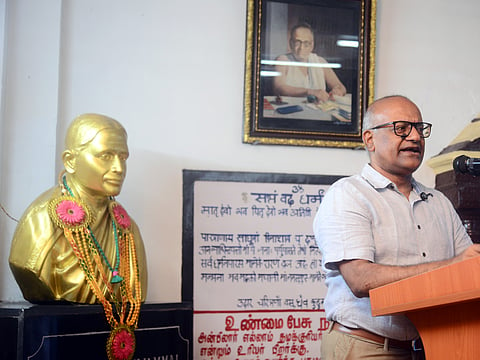

Life, in its earliest form, began without any concept of houses or territory. It slowly evolved into buildings we now call home and lands we claim as ours. But for centuries, what was ours was ruled by foreigners. Natives lived like slaves in their own country. Millions who fought the freedom struggle are only mentioned in passing.
Why were these individuals’ lives undocumented? The reasons could be plenty. S Ambujammal’s autobiography, Nan Kanda Bharatham, refers to many such rebels. “I stopped the count after 65, I am sure there are more than a hundred names she has recorded in her book,” says Sriram V, a historian and an author, who has translated this work to English as The India I Saw.
The book was launched in the city on Friday at Srinivasa Gandhi Nilayam, an institution established by the freedom fighter in association with the Indian National Trust for Art and Cultural Heritage (INTACH). Nan Kanda Bharatham is a recounting of Ambujammal’s life from the 1920s to 1973 when this biography was published.
“I had to maintain her voice in the translation,” says Sriram talking about the translation process. Maintaining the book’s tone and recalling historical events factually were his challenges. He adds that in a few chapters, he could have written the incident in a little polished way for the reader. But he held back because, “This is how she has said it, so it has to be the same way.” Ambujammal wrote this book when she was 75, hence Sriram points out that there are two minor historical errors in the original text, which is mentioned in the footnote.
Life and times of Ambujammal
The book is written in a conversational perspective and incidents are mentioned matter-of-fact. For instance, when Ambujammal was born, the whole family was heartbroken. On the contrary, when her brother was born, the birth was celebrated like a carnival.
Sriram recalls from the book, that when the brother, Parthasarathy, was of the age to attend school, a celebration took place. Nadaswaram was played, and he was escorted to the school with a seer varisai. Ambujammal writes, ‘In those days girls were not treated like that. They were educated at home’. To which Sriram comments, “No explanation on why the difference in behaviour. She describes the ceremony that went on for her brother becoming a school student, and that she was taught at home. Period.”
Her crime? Born a girl. Her punishment? Disappointment, tragedy and failure followed her like a shadow. She was uninformed about her marriage till the ceremonies started. It was an unhappy marriage; unable to fulfill her desires, her husband left her. Ambujammal had to take care of her child by herself.
These recurring instances of leading a life without a motive ended when the Gandhis came to Madras in 1915. Srinivasa Iyengar (Ambujammal’s father) threw a tea party for them. This event gradually transformed Ambujammal’s life. From being restricted in the four walls of Amjad Bagh, her house, she began involving in the independence movement. “In fact, she considers it is her duty and responsibility to be a part of the freedom struggle,” shares Sriram.
While participating in the Civil Disobedience Movement (1930), Srinivasa misinformed the police that Ambujammal is mentally unwell. Proving him wrong, she went to jail for protesting against foreign goods. Sriram remarks, “I assumed that people were just going to jail for some fight. Here, I realised that there were oppositions in the family. So these perspectives come to you only when you read a biography. Otherwise, you read a history book telling they went to prison and then life goes on. But there is so much fight put up to go to prison.”
After attaining freedom, Ambujammal had a vision for an independent India. “She says after India becomes independent, everything has to now go in the direction of social welfare. So that is how she starts working for the people,” he notes.
Beyond a freedom fighter: Ambujammal learnt Hindi with the guidance of Gandhi and translated Hindi books by notable authors like Munshi Premchand, Mahadevi Verma, Suryakant Tripathi in Tamil. Sevasadan (Bazaar-e-Husn) was translated in Tamil and the movie adaptation was released in 1938. It was MS Subbulakshmi’s acting debut.
The book details the political evolution from Madras Presidency, Madras State, and Tamil Nadu. "She is witnessing everything from the time when the sun was not setting on the British Empire to Dravidian politics taking root," says Sriram. She completed this book ten-odd years before her death when she lost her eyesight.
The autobiography gives rare glimpses not only into the freedom struggle, but also into the social cultural view of Madras as to how this city is evolving. In her writing, she describes Luz Church Road as a forest. Any woman who walked alone was sure to have her chain snatched or her bag stolen. “She says in the Bheemanna Mudali street, there was a village called Beemannapettai where riots would break out frequently and there would be deaths. It was known for its lawlessness. Now, we cannot imagine the area to be like that. It is a respectable part of Alwarpet today. But in her description it’s a very different place,” explains Sriram.
Ambujammal concludes her book saying, “I realise that everything that happened to me was the will of God, and to him I surrender myself and all that I have written in this book”.